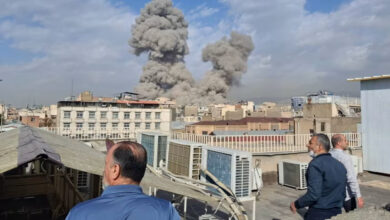Remember that iconic scene from sci-fi classic “The Rebel,” when Neo and Trinity are preparing for a daring rescue operation? She asks him what they’ll need to pull it off, and he replies with a super-quotable line before an entire planet’s worth of firearms suddenly appears out of nowhere?
No?
Perhaps that’s because when you watched it, it was in a movie called “The Matrix.” The change is only one example of how “some things are impossible to translate in a meaningful way,” according to Daoud Rofail Khashaba, director of translation at Anis Ebeid Films, the Arab world’s most prominent subtitling company.
Had the team at Anis Ebeid sufficed themselves with providing a straightforward translation, Egyptian audiences might have passed on “Al-Masfoufa,” which has the double disadvantage of sounding like an unreliable kitchen utensil, and also being strictly feminine – in other words, not a purely accurate representation of a dystopian sci-fi action film. But, as Khashaba explains, translating films is about a lot more than accuracy.
“Our work is not translation in the strictest sense of the word,” says Khashaba, who, after 25 years in the field, has become a knowledgeable, yet endearingly humble, expert on the topic. “When you’re translating, you’re held hostage by time constraints – a spoken phrase or sentence is typically delivered in a few seconds, which is a problem because you don’t want your text to either outlast or lag behind the action.”
“The trick to translating for film subtitles,” he reveals, “is to stay concise without losing the meaning or nuances revealed through the original dialogue.”
For film translators, every genre comes with its own difficulties. “Comedies can be tricky, because of all the slang, puns and wordplay,” Khashaba explains, adding that “Shakespeare adaptations are also problematic because the essence of the drama, not to mention the artistry, is in the original text and word-choice – it’s not just dialogue that you can replace with another language.” Somewhat surprisingly, the 84-year-old shrugs off musicals as “not a big deal – there are two paths to take, either you focus on the rhyme, or on accuracy. Once you’ve made that choice, it’s fairly straightforward.”
Further difficulties can be found in films which feature specific, or technical, terminology. “I remember when I did ‘Wall Street,’ I had a miserable time coming up with accurate, coherent translations for the more detailed economic talk, and keeping it all simple enough so that the text would be in sync with the rapid dialogue.”
Khashaba recalls facing similar issues on “Silence of the Lambs,” “JFK,” and “Dances with Wolves,” to name but a few of the past century’s most popular movies which he effectively rewrote for an entire region of non-English speakers.
“’Dances with Wolves’ was annoying because the original film already had a lot of English subtitles. I had to find a way to keep the screen from filling up with text.”
Kevin Costner also made Khashaba’s life more difficult because of all the “historical context that Egyptian or Arab audiences might be unfamiliar with.” As Khashaba points out, “in film, and unlike literature, you can’t add footnotes or appendixes. You have to figure out a way to do all your explaining through the very limited timeframe you have, while still staying loyal to what’s being said every moment onscreen.”
This is even more challenging than it sounds as, surprisingly, the translators at Anis Ebeid base their work on a written script, instead of watching and transcribing the actual film. “If there are things that remain unclear to us after reading the script, we can request a screening of the film,” says Khashaba, but in most circumstances foreign film studios will send a copy of the script along with their film, both of which are promptly handed over by the Anis Ebeid company to the state censorship committee.
“The censors will read the script and watch the film, and then they’ll send it back to us with notes, and we’re responsible for removing the content which they’ve deemed to be too offensive for the audience,” Khashaba says.
Throughout his years as a translator, Khashaba has witnessed how the censorship committee’s standards are influenced by social, as well as political trends. This is especially noticeable in text-only censorship, in which certain words in the dialogue are “not allowed to be translated and are removed from the subtitles.”
“There was a time when words like “Jewish” and “Israeli” were removed from the text if they were mentioned in a negative way onscreen,” Khashaba claims. “We had to make sure that they were only ever subtitled in a positive context.”
Similarly, there were instances when Khashaba would be in the process of “translating an American movie that was critical of the American government, and an official order would come in to ignore any lines in the dialogue that were too critical.”
Although it may not seem like it, these are among the more sensible official orders which Khashaba has been forced to carry out in his career. “I was asked one time to remove a line from ‘A Midsummer Night’s Dream.’ It was a reference to Apollo’s chariot, describing it as the ‘chariot of the gods,’ which the censors thought was blasphemous.”
“That was ridiculous,” Khashaba shakes his head.
Also ridiculous was a policy by a Gulfi country that the word church only be subtitled as place of worship.
“We’re oversensitive,” Khashaba shrugs when asked for his opinion on the reason behind the region’s enthusiasm for butchering artwork, cinematic or otherwise. “There’s the constant fear that you could offend someone, or cause a problem, so you react in a paranoid, irrational way,” which, he wisely points out, only leads to much bigger problems.
Nonetheless, Khashaba believes that “right now, we do need to have some form of censorship in place,” although he would ultimately like to see the outdated policies replaced with a “proper rating system to efficiently regulate and classify content,” much like the Motion Picture Association of America, or the British Board of Film Classification. His reasoning is that, “if the state allows a film to be screened, then they should also allow it to keep its content, instead of removing so much of it that releasing the film becomes pointless.”
Today, Khashaba does minimal translating, devoting most of his time to writing essays on philosophy – he has had five books published, four of which have been translated into Arabic – and posting insightful and highly entertaining updates on his personal blog. However, hearing him recall his time as a translator is revealing of his love for both the written word and the moving image.
“My favorite film to translate,” he takes a moment to consider before answering, “was 'Gandhi.' It was beautifully made, and the characters talked slowly.”




